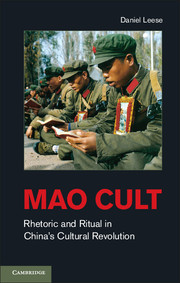Book contents
- Frontmatter
- Contents
- Illustrations, Figures, Maps, and Table
- Preface
- Chronology of Major Events
- Abbreviations
- Map Administrative divisions of China
- Introduction
- Part One Coming to Terms with the “Cult of the Individual”
- Part Two Charismatic Mobilization
- Part Three Cult and Compliance
- 7 Ambiguous Symbols
- 8 The Language of Loyalty
- 9 Rituals and Commodities
- 10 Curbing the Cult
- Conclusion
- Bibliography
- Glossary
- Index
8 - The Language of Loyalty
from Part Three - Cult and Compliance
Published online by Cambridge University Press: 07 October 2011
- Frontmatter
- Contents
- Illustrations, Figures, Maps, and Table
- Preface
- Chronology of Major Events
- Abbreviations
- Map Administrative divisions of China
- Introduction
- Part One Coming to Terms with the “Cult of the Individual”
- Part Two Charismatic Mobilization
- Part Three Cult and Compliance
- 7 Ambiguous Symbols
- 8 The Language of Loyalty
- 9 Rituals and Commodities
- 10 Curbing the Cult
- Conclusion
- Bibliography
- Glossary
- Index
Summary
By the time Mao returned to Beijing in late September 1967 to announce his seemingly optimistic appraisal of the situation, revolutionary committees had been established in only seven of China’s twenty-nine provinces and municipalities. Despite Mao’s promising rhetoric, the situation was bleak. Physical confrontations between contending factions continued well into 1968 and took on ever more extreme forms. It was to take another year, until 5 September 1968, that the last revolutionary committees assumed power in the autonomous regions of Tibet and Xinjiang and only with the convention of the Ninth Party Congress in April 1969 was a new CCP leadership officially sanctioned. The ritual worship of Mao Zedong culminated during this phase of uncertainty about who was to emerge victorious from the rubble of the factional disputes. Fostering the cult came to assume a crucial role in trying to maximize individual gains in the struggle for power at different levels of society. But for most Chinese, taking part in public worship became a crucial element of surviving within a completely volatile situation dominated by witch hunts against supposed counterrevolutionaries during the campaign to “cleanse the class ranks” (qingli jieji duiwu). The rhetorical and ritual demonstrations of loyalty to Chairman Mao that came to dominate everyday life cannot be understood without taking into account this frenzied atmosphere within which people were sentenced to death because they had unintendedly misspelled a Mao quotation or burned a newspaper carrying his image. This chapter analyzes cult rhetoric in the continuing process of reestablishing political and symbolical power by looking at the cult’s employment in everyday life. After a discussion of the role of the omnipresent Mao Zedong Thought Activist Congresses, the rhetoric of the most exuberant campaign of worshipping Mao Zedong, the “Three Loyalties” (san zhongyu) or “Three Loyalties, Four Boundlesses” (san zhongyu, si wuxian) campaign, shall be examined. Special emphasis will be given to the characteristics and functions of the ensuing loyalty discourse that resulted in extravagant flattery and the propagation of ever-new miracles performed by applying Mao Zedong Thought.
- Type
- Chapter
- Information
- Mao CultRhetoric and Ritual in China's Cultural Revolution, pp. 174 - 194Publisher: Cambridge University PressPrint publication year: 2011



